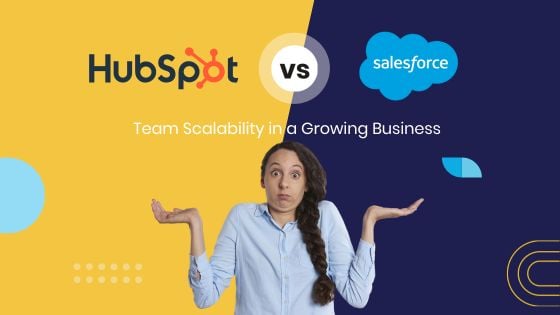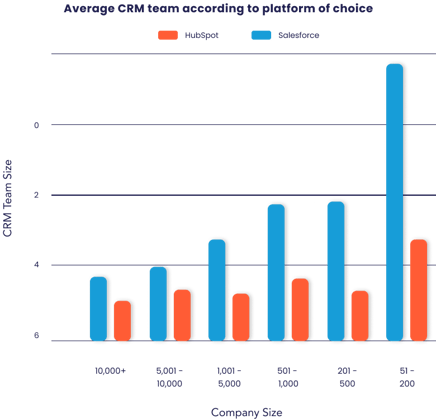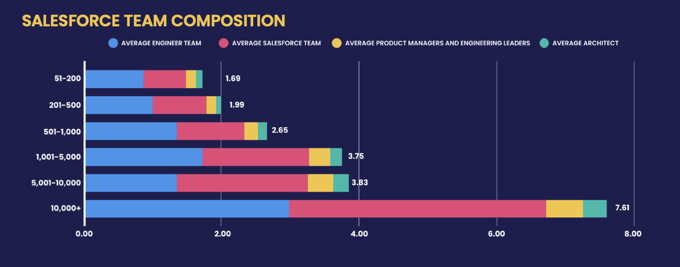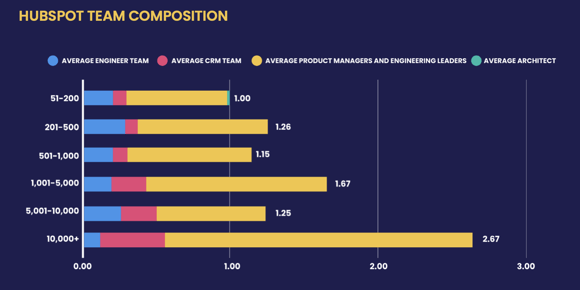


HubSpot Vs. Salesforce: Team Scalability in a Growing Business




You’ve got a growing business - congratulations, that’s wonderful! However, with growth comes the challenge of increasing team size and personnel costs.
As your company scales, the size of your CRM teams inevitably expands. But is the growth trajectory of teams similar for each CRM?
We beg to differ!
Our team has conducted a research report comparing Salesforce and HubSpot’s total cost of ownership, focusing on hiring for specific CRM roles and team structures.
Dynamics of Team Scalability Within a Growing Business
We all love a growing business, but it comes with added responsibilities and increased costs. With your customer base increasing your business would only continue to be stable when you strategically invest in personnel accordingly as well.
Especially your CRM team - which manages customer interactions through each touch point in the customer journey, data management, and overall customer experience.
Actually, it's not just about hiring more people; it's about strategically aligning your team structure with the ever-evolving needs of your growing business.

Now, let's zoom in on two major players in the CRM game – HubSpot vs. Salesforce– and see how they shape the workforce and accommodate the challenges that come with company growth.
Team Structures within Salesforce

Salesforce is more than just a CRM; it's a cornerstone for go-to-market teams, influencing how companies organise and operate. A critical aspect of Salesforce's impact lies in the team structures it fosters, and as businesses grow, so does the demand for Salesforce talent.
Average Total Salesforce Team Size Across Company Sizes
When we look at the data, an interesting trend pops up: As companies scale, the customisation requirements of Salesforce become more necessary. In turn, we see companies hiring more salesforce team members to effectively manage the platform.
This trend of scalability not only highlights strategic adjustment but also brings to light the related costs. As companies get bigger, they invest more in Salesforce talent, showing the platform's flexibility to meet various business needs.
Team Composition
Interestingly, as companies grow, the ratio of engineering, platform support, product managers, engineering leads, and architects remains relatively stable.
This implies that, regardless of company size, there is a need to increase talent within these roles to meet the growing demands of the business.
However, the consistent presence of architect roles across all company sizes is notable.
Architects play a vital role in ensuring the stability, security, and continuous improvement of the Salesforce Platform, emphasising the importance of ongoing support and maintenance resources.
Salesforce Support Team Emphasis in Larger Companies
The data highlights the critical role of an expansive Salesforce support team in larger enterprises, constituting over 48% of the workforce in companies with more than 5,001 employees. This underlines the correlation between substantial investments in Salesforce and the need for a proportionally larger infrastructure to ensure the team's success.
Team Structures Within HubSpot
In contrast to Salesforce's robust and scalable approach, HubSpot CRM, an emerging force in the CRM market, distinguishes itself through agility, user-centric design, and a comprehensive strategy towards customer engagement.

Average Total HubSpot Team Size Across Company Sizes
HubSpot's team structures reveal a marginal increase in total team size as companies grow, with a modest uptick.
Notably, this increase is linked to the rising presence of product managers and engineering leaders.
As organisations adopt more sophisticated HubSpot CRM packages, there is a demand for leadership roles overseeing the strategic customisation and optimisation of the platform.
Emphasis on Product Managers and Engineering Leads
HubSpot's team structures maintain consistent stability in composition as companies grow.
From SMEs to large enterprises, the core teams remain remarkably consistent, reflecting a deliberate effort to maintain a balanced and effective team structure.
The average total team size to manage HubSpot CRM remains small, showcasing how each go-to-market team can manage the customer platform without extensive platform-specific talent.
The Strategic Significance of Engineering Leadership
Notably, as companies expand, there is a pronounced demand for engineering leaders within the HubSpot ecosystem. This aligns with the need for strategic guidance in navigating complex technical landscapes, reflecting HubSpot's commitment to providing businesses with the necessary expertise to thrive in diverse operational environments.
Stagnancy in Architects
Unlike Salesforce, HubSpot's streamlined approach leans towards agility and efficiency without the need for specialised architectural roles.
The absence of architects signifies HubSpot's focus on simplicity, emphasising a model that doesn't rely heavily on intricate technical roles but rather on the adaptability and efficiency of its platform.
Conclusion
HubSpot Vs. Salesforce - who’s the winner?
Salesforce and HubSpot present contrasting strategies when approaching CRM team expansion in a growing business. It's not a one-size-fits-all scenario.
The key lies in selecting the CRM platform that aligns seamlessly with your business's distinctive needs and objectives.
If you value a feature-rich environment and strategic alignment, Salesforce may be the right choice. Conversely, if you prioritise flexibility and adaptability in your CRM team structure, HubSpot's organic growth could be your dynamic sidekick.
... Still can't pick a winner in the ongoing HubSpot Vs. Salesforce showdown? Maybe these can help:
|
|
|








